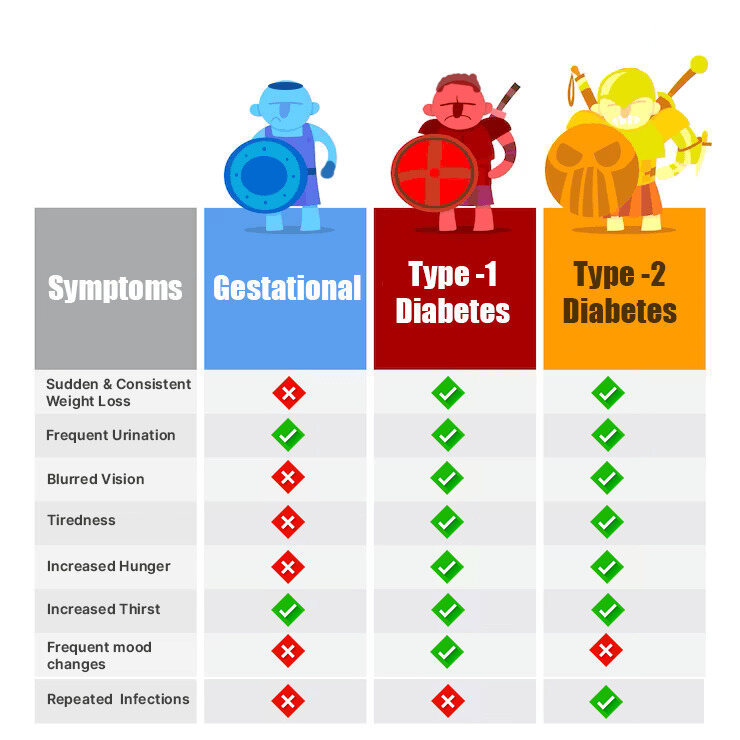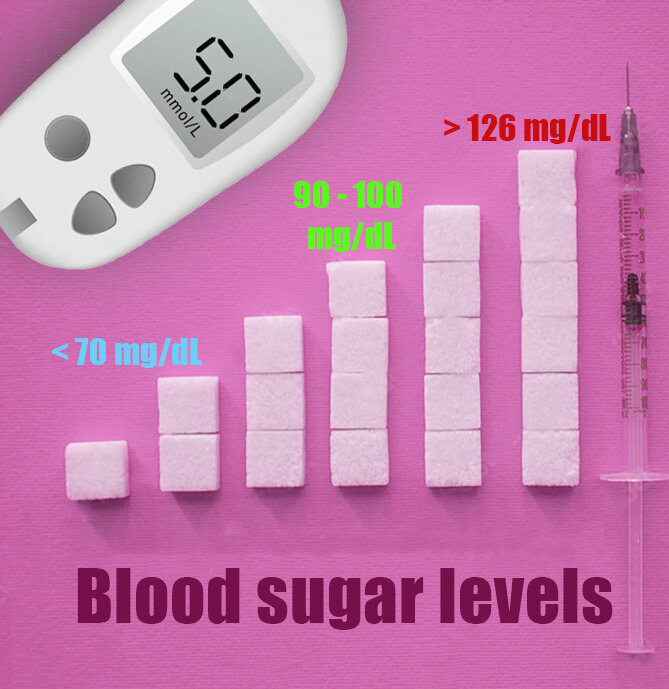Diabetes Mellitus
Mar 07, 2023
What is Diabetes Mellitus?
Diabetes Mellitus is a long-term condition that occurs when your body does not produce enough insulin (Type 1) or if the body does not use the insulin produced by the pancreas (Type 2) effectively to regulate blood sugar levels
Breakdown of food releases glucose or sugar into the blood for energy
When there is too much glucose in the blood your body signals the pancreas to release insulin to regulate blood sugar levels
When there is no control of blood sugar levels in the body it leads to Diabetes
The increase of blood sugar to above the normal level is known as Hyperglycemia (high blood sugar level) and if blood sugar is below the normal level it is known as Hypoglycemia (low blood sugar level)
Types and Causes of Diabetes Mellitus
Broadly, there are four types of Diabetes, out of which the first two are commonly known and diagnosed.
Type 1 diabetes mellitus is a condition where the immune system of the body attacks the Beta cells in the pancreas where insulin is produced, The immune system thinks that the pancreatic cells are a foreign body. This leads to low production or stoppage in the production of insulin
Causes:
- Genetics & Hereditary reasons
- Autoimmune response
- Viral Infections
- Other medical diseases or disorders
Type 2 diabetes mellitus occurs when the body does not use the insulin produced by the pancreas and develops a resistance to the insulin being released. Therefore, this causes a rise in high blood sugar levels
Causes:
- Lack of Physical Exercise
- Eating unhealthy food
- Obesity
- Taking medicines that increase the risk of getting diabetes
- Other medical conditions that lead to diabetes
Gestational Diabetes occurs when the body is not able to produce enough insulin during pregnancy.
The placenta organ in the mother’s womb that provides oxygen and nutrients to the developing baby produces insulin-blocking hormones causing an increase in blood sugar levels.
Gestational Diabetes occurs more among women who are overweight or gain too much weight during pregnancy
It can lead to a future risk of developing Type 2 diabetes mellitus condition
Causes:
- Hormonal changes during pregnancy
- Placental hormones affecting insulin production
- Obesity during pregnancy
- Hereditary reasons
- Diabetes problem in a previous pregnancy
Diabetes Insipidus is a rare form of Diabetes that occurs when the kidney removes too much fluid from the body in the form of urine
Causes:
- Neurogenic & Nephrogenic reasons
- Head Injury Trauma & Brain Tumors
- Genetics
- Taking certain medicines that cause this condition
Prediabetes is a condition where your blood sugar level is a bit above normal level but it is not at a very high level. This is a phase where you have to take all measures to prevent diabetes
Diabetes Symptoms

Who is at risk of having Diabetes?
Type 1 Diabetes: Juvenile diabetes in young children from age of 4, teenagers and adults
Type 2 Diabetes: Majorly children above the age of 10, teenagers and adults, and Women who have Polycystic ovary syndrome (PCOS) and who already had Gestational diabetes
Neonatal Diabetes: Rare case of 6-month-old babies having diabetes
Gestational Diabetes: Pregnant women
What are the complications of Diabetes?
Type 1 & 2 Diabetes complications:
- Heart attack, heart stroke, or disease
- Vision and hearing loss
- Depression
- Dementia
- Soreness and damage to the legs which can result in amputation
- Nerve Damage
- Kidney Damage
- Skin & Bacterial infections
Gestational Diabetes complications:
- Risk of getting Type 2 diabetes
- Jaundice
- Still or premature birth
- Overweight baby at birth
- Low blood sugar
- Higher risk of gestational Diabetes in future pregnancies
What are the normal blood sugar levels observed?
|
Item |
Before Food |
After Food |
|
People who do not have Diabetes |
Between 4.0 to 5.4 mmol/L (72 to 99 mg/dL) before eating |
Up to 7.8 mmol/L (140 mg/dL) 2 hours after eating |
|
People with Diabetes |
4 to 7 mmol/L for people with type 1 or type 2 diabetes before eating |
Under 9 mmol/L for people with type 1 diabetes and under 8.5mmol/L for people with type 2 diabetes after eating |

Diabetes Mellitus diagnosis
The general rule is anyone showcasing the symptoms of Diabetes and whose family has a history of the same should get tested. There is one test used to diagnose Diabetes:
The FPG (Fasting Plasma Glucose) tests your blood sugar level post an 8-hour fast.
To reconfirm that the diagnosis is correct, doctors might also suggest conducting an A1C test which gives a historical report of the patient’s blood sugar levels over the previous three months
Diabetes Treatment
Doctors usually prescribe the treatment plan based on the type of Diabetes the patient has
People with Type 1 Diabetes, take Insulin shots or injections to restore the balance of blood sugar in the body. Various types of Insulin shots are prescribed and differ in how they react and how long they stay in the body
For people with Type 2 diabetes, Insulin is recommended based on the severity of the disease. The usual treatment for Type 2 diabetes is dietary and lifestyle changes with medicines
Pregnant women diagnosed with gestational Diabetes will need to exercise and make dietary changes if their blood sugar levels are very high. In some cases, they may prescribe Insulin, which is also considered safe for the baby.
Living with and learning how to control Diabetes
- Avoid food rich in starch and sugar such as bread, rice, potatoes, pasta, chocolates, and other sweets
- Spilt the meals you eat based on the amount of carbohydrates intake
- Eat a healthy diet that has fruits, green leafy vegetables, and whole grains are a large part of daily meals
- The following foods are rich in vitamins, healthy & low dairy fats, antioxidants, antibacterial & nutritional elements and help in regulating one’s blood sugar levels:
• Chicken & Eggs
• Flax Seeds
• Nuts
• Fatty Fish
• Berries
• Beans
- Minimum of 30 mins exercise (walking, cycling, swimming, and aerobics) every day can help. Daily physical movement transcends into other aspects of one’s life and results in better mood & sleep, healthier weight, & stronger memory recall
- Check your blood sugar, blood pressure and cholesterol levels regularly
- Get enough sleep and avoid any stress
- In case of any emergencies get your doctor’s help or get to the nearest hospital for immediate care
How to prevent Diabetes?
Genetic or Hereditary diabetic conditions cannot be prevented they can be only managed
Other diabetic causes can be prevented by
- Trying your best to resist and overcome temptations that make your diet unhealthy that is to avoid eating unhealthy foods
- Making time for physical activities and sports beyond a busy schedule or laziness and trying to control weight as much as possible
- Getting proper sleep 8 hours a day
FAQ about Diabetes
1. What does diabetes have to do with heart disease?
Diabetes is a condition in which your body does not produce enough insulin, or it produces too much insulin. When this happens, the blood glucose (sugar) levels rise, and you may develop high blood sugar. This excess sugar can damage the walls of your arteries, increasing the risk of heart attack or stroke
2. Can I have a baby if I have Diabetes?
Yes, you can, you just have to monitor your sugar levels & food intake thoroughly while pregnant.
3. Can I lead a normal life with diabetes?
Yes, this is a disease that occurs due to the deficiency of insulin. When the blood sugar is kept under control, a diabetic can have a healthy, normal life.
Conclusion
Living with Diabetes does not mean a life less lived. Some elements of this disease are beyond one’s control, especially with Type 1 diabetes. However, especially in the case of Type 2 diabetes, it is possible to enjoy some of your favourite foods in small quantities while maintaining a balanced diet and physical exercise to ensure that blood sugar levels do not rise. Overall, incorporating a lifestyle that includes a healthy diet, weight balance, and continuous exercise can help reduce the risk of Diabetes
Recent Post

Why Should You Book Lab Tests Online?
_(1)_CAT_1640504567.jpg)
ஸ்மார்ட் போன்களால் ஏற்படும் பிரச்சனைகள்

Type 2 Diabetes Mellitus

Type 1 Diabetes Mellitus
_CAT_1684759383.jpg)
Tooth Cavities

Summer Skincare Routines and Sunscreen Recommendations

நமது வாழ்க்கையில் இன்சுலினின் பங்கு

Raising Happy and Healthy Kids!!!

Order Medicine Online in Chennai at Your Fingertips

Online Pharmacy in Chennai

